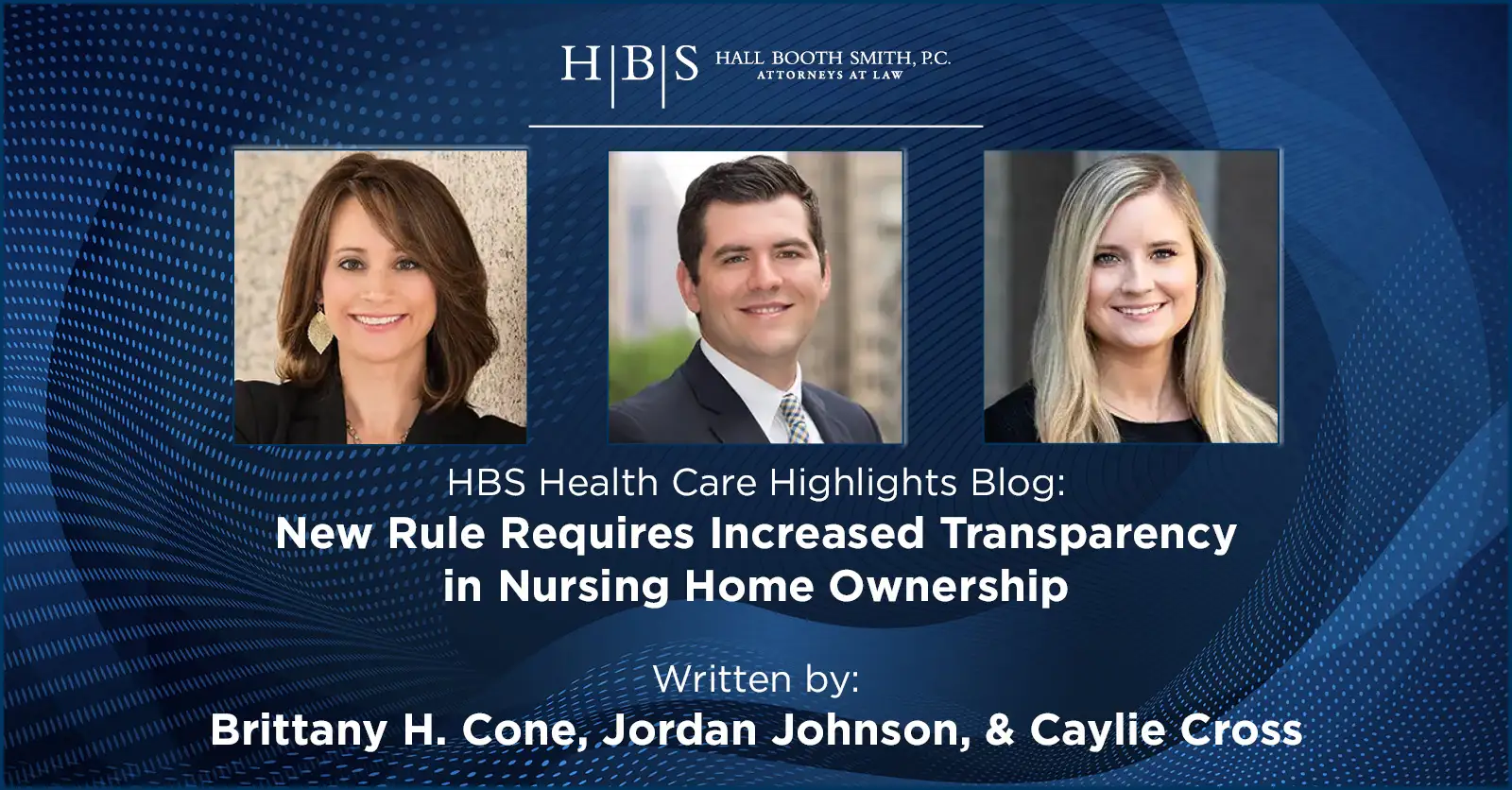
New Rule Requires Increased Transparency in Nursing Home Ownership
Background
On November 15, 2023, the Centers for Medicare and Medicaid Services (CMS) finalized a rule requiring increased transparency in nursing home ownership. Specifically, the final rule implements portions of section 6101 of the Affordable Care Act, which requires disclosure of certain ownership, managerial, and other information regarding Medicare skilled nursing facilities (SNFs) and Medicaid nursing facilities. It also finalizes definitions of “private equity company” and “real estate investment trust” for Medicare provider enrollment purposes.
New Disclosure Requirements
Section 6101(a) of the Affordable Care Act added a new section 1124(c) to the Social Security Act, establishing requirements for disclosure of nursing home ownership and oversight information. Currently, nursing homes must report certain ownership and management data to CMS and the states as part of the Medicare and Medicaid enrollment processes. However, some information, under section 1124(c) of the Social Security Act, was not previously required to be disclosed.
The rule finalized on November 15, 2023, requires that nursing homes disclose the following additional data to CMS or the applicable state Medicaid agency:
- Each member of the facility’s governing body including the name, title, and period of service for each member.
- Each person or entity who is an officer, director, member, partner, trustee, or managing employee of the facility, including the name, title, and period of service of such person or entity.
- Each person or entity who is an additional disclosable party[1] of the facility.
- The organizational structure of each additional disclosable party to the facility and to one another.
The nursing facility must report the additional information upon initially enrolling in Medicare or Medicaid (this includes changes of ownership) and when revalidating their Medicare or Medicaid enrollment. For Medicare SNFs, the data will be reported via the Form CMS-855A Medicare enrollment application. For Medicaid nursing facilities, the data will be reported via means implemented by individual states.
CMS will announce when the revised Form CMS-855A is released, but providers and suppliers will be allowed to use the prior version of the Form for 30 days following the release of the revised Form. Once enrolled, a Medicare SNF must disclose any changes to this information within the timeframes specified in § 242.516(e) for reporting changes in enrollment data.
Moreover, since CMS and the states already collect some of the data outlined in section 1124(c), CMS will not require Medicare SNFs to report the same information twice on the same Form CMS-855A Medicare enrollment application.
The additional data will be publicly reported within one year pursuant to section 6101(b) of the Affordable Care Act.
Definitions
CMS previously revised the Form CMS-855A Medicare enrollment application to require all providers and suppliers to disclose whether a particular owning or managing entity is a “private equity company” or “real estate investment trust”. This final rule clarifies these undefined terms as follows.
Private Equity Company
A private equity company is a publicly traded or non-publicly traded company that collects capital investments from individuals or entities (investors) and purchases a direct or indirect ownership share of a provider (for example, an SNF).
Real Estate Investment Trust
Furthermore, CMS adopts the definition of real estate investment trust used in 26 U.S.C § 856, which defines it as a “corporation, trust, or association —
- which is managed by one or more trustees or directors;
- the beneficial ownership of which is evidenced by transferable shares, or by transferable certificates of beneficial interest;
- which (but for the provisions of this part) would be taxable as a domestic corporation;
- which is neither
- a financial institution referred to in section 582(c)(2)
- nor an insurance company to which subchapter L applies;
- the beneficial ownership of which is held by 100 or more persons;
- subject to the provisions of subsection (k) [of this chapter], which is not closely held…; and
- which meets the requirements of subsection (c) [of this chapter].”[2]
Additional Guidance
CMS will provide information at a later date as to how the collected data will be publicly posted. The agency will also issue guidance explaining the new requirements to stakeholders, such as examples of the types of data that must be disclosed. The final rule becomes effective on January 16, 2024.
For more information, please visit The Federal Register to view the Final Rule.
Footnotes
- Additional disclosable parties include people or entities that: exercise financial control over the SNF; lease or sublease real property to the SNF; own a whole or a part interest equal to or exceeding 5% of the total value of such real property; provide the SNF administrative services, clinical consulting services, accounting or financial services, policies, or procedures for any of the SNF’s operations, or cash management services.
- 26 U.S.C. § 856.
Disclaimer
This material is provided for informational purposes only. It is not intended to constitute legal advice nor does it create a client-lawyer relationship between Hall Booth Smith, P.C. and any recipient. Recipients should consult with counsel before taking any actions based on the information contained within this material. This material may be considered attorney advertising in some jurisdictions. Prior results do not guarantee a similar outcome.
Blog Overview
About the Authors
Brittany H. Cone
Partner | Atlanta Office
T: 404.586.6620
E: bcone@hallboothsmith.com
Brittany H. Cone focuses her practice on a wide range of regulatory, administrative, and litigation matters in health care. Certified in Health Care Compliance by the Health Care Compliance Association, she works with providers on the full spectrum of issues they face including Medicare, Medicaid, regulatory compliance, administrative hearings, and appeals.
Jordan Johnson
Partner | Atlanta Office
T: 404.586.6639
E: jjohnson@hallboothsmith.com
Jordan Johnson specializes in aging services and health care matters. His practice features a wide range of regulatory, administrative, and litigation matters, including the full spectrum of issues healthcare providers face such as reimbursement, regulatory compliance, and administrative hearings and appeals.
Caylie Cross
Attorney at Law | Atlanta Office
T: 404.954.6946
E: ccross@hallboothsmith.com
Caylie Cross works primarily on aging services and health care matters. She recently earned her Juris Doctor from Emory University School of Law. Caylie previously worked as a summer associate for the Atlanta office and has also interned at both the Atlanta Legal Aid Society and Rhode Island Center for Justice.






Leave a comment
You must be logged in to post a comment.